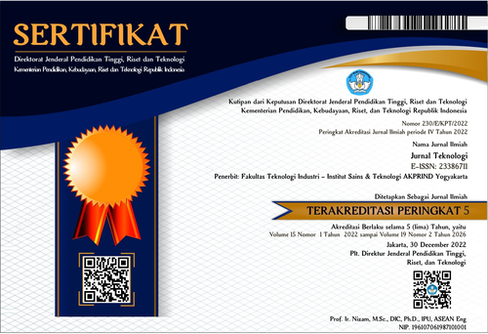Penggunaan TOGAF ADM Untuk Mengidentifikasi Ketidaksesuaian Pada Aplikasi Pencari Kerja
DOI:
https://doi.org/10.34151/jurtek.v16i1.4272Keywords:
information systems , technology architecture, TOGAF ADMAbstract
The identification of non-conformities aims to create harmony between business and information technology for current and future organizational needs. The successful implementation of identification is inseparable from an organization planning and designing the enterprise architecture. Planning and designing this requires a complete and easy-to-use methodology. In this research, a case study was carried out for information system strategic planning by applying the TOGAF ADM method with the help of the value chain model and other modeling tools in job seeker applications. The stages of the TOGAF ADM methodology are translated into enterprise architecture modeling, namely vision architecture, business architecture, information system architecture and technology architecture. The results of modeling with the TOGAF ADM methodology provide a basis for overcoming problems and are an effort to optimize a data input design and add validation to the input design which can help reduce the risk of unwanted data such as duplicate data, inappropriate data and so on.
Downloads
References
Agit Amrullah, Ema Utami, 2018. Perancangan Sistem Informasi Pada Smart UMKM dalam Mendukung Sleman Smart Regency. Konferensi Nasional Sistem Informasi (KNSI) 2018.
Alhari, Muhammad Ilham, Asti Amalia Nur Fajrillah, and Muharman Lubis, 2022, Business Value Assessment and IT Roadmap to Achieve e-Government Dimension of Smart Village using TOGAF ADM: A Case Study of Regency in Indonesia. 2022 6th International Conference on Information Technology, Information Systems and Electrical Engineering (ICITISEE). IEEE.
Hermawan, R. A., & Sumitra, I. D. 2019, Designing Enterprise Architecture Using TOGAF Architecture Development Method. In IOP Conference Series: Materials Science and Engineering (Vol. 662, No. 4, p. 042021). IOP Publishing.
Kossmann, Jan, Thorsten Papenbrock, and Felix Naumann. 2022, Data dependencies for query optimization: a survey. The VLDB Journal 31.1 (2022): 1-22.
Laudon, Kenneth C.; & Laudon, Jane P .2020. Management Information System: Managing the Digital Firm, Fifteenth Edition. England : Pearson Prentice Hall.
Li, Yang, Ting Yuan, and Kewei Yu., 2022, Design and Implementation of Taijiquan Learning System based on PHP+ MySQL. 2022 International Conference on Information System, Computing and Educational Technology (ICISCET). IEEE Computer Society.
Lu, Wenyang., Chen, Yan., Wu, Jingya., Zhang, Yu., Li, Xiaowei., & Yan, Guihai. 2022. DOE: Database Offloading Engine for Accelerating SQL Processing. In 2022 IEEE 38th International Conference on Data Engineering Workshops (ICDEW) (pp. 129-134). IEEE.
Oladele, T. O., Ogundokun, R. O., Adegun, A. A., Adeniyi, E. A., & Ajanaku, A. T., 2021. Development of an inventory management system using association rule. Indonesian Journal of Electrical Engineering and Computer Science, 21(3), 1868-1876.
Ren, Lei, and Yuanyuan Chen., 2021, Research on the Application of Data Mining Technology in Military Audit. 2021 International Conference on Education, Information Management and Service Science (EIMSS). IEEE.
Zhang, Hao, and G. A. I. Rong-Li. 2021, Distributed HBase Cluster Storage Engine and Database Performance Optimization.2021 IEEE 23rd Int Conf on High Performance Computing & Communications; 7th Int Conf on Data Science & Systems; 19th Int Conf on Smart City; 7th Int Conf on Dependability in Sensor, Cloud & Big Data Systems & Application (HPCC/DSS/SmartCity/DependSys). IEEE.
Zheng, Bing Xu., Li, X., Tian, Zhenzhen., & Meng, Liming., 2022. Optimization Method for Distributed Database Query Based on an Adaptive Double Entropy Genetic Algorithm. IEEE Access, 10, 4640-4648.
Downloads
Published
How to Cite
Issue
Section
License
Copyright (c) 2023 Muhammad Anwar Fauzi, Ema Utami, Tonny Hidayat

This work is licensed under a Creative Commons Attribution 4.0 International License.
Jurnal Teknologi provides immediate open access to its content in order of making research freely available to the public to support a global exchange of knowledge. All articles published in this journal are free for everyone to read and download, under licence CC BY SA.
Benefits of open access for the author, include:
- Free access for all users worldwide.
- Authors retain copyright to their work.
- Increased visibility and readership.
- No spatial constraints.




















